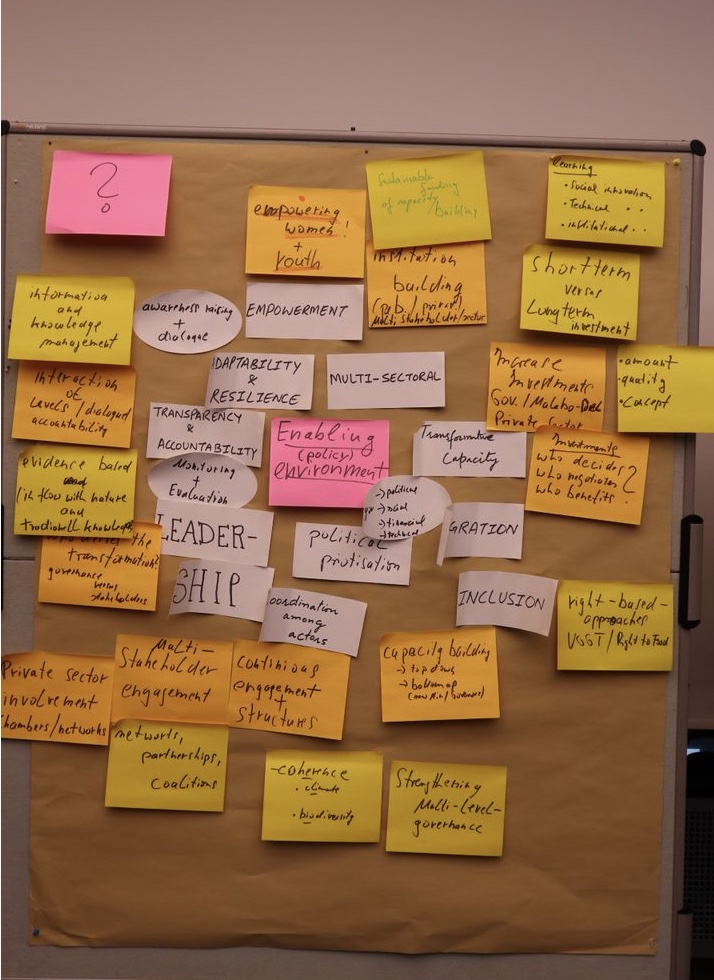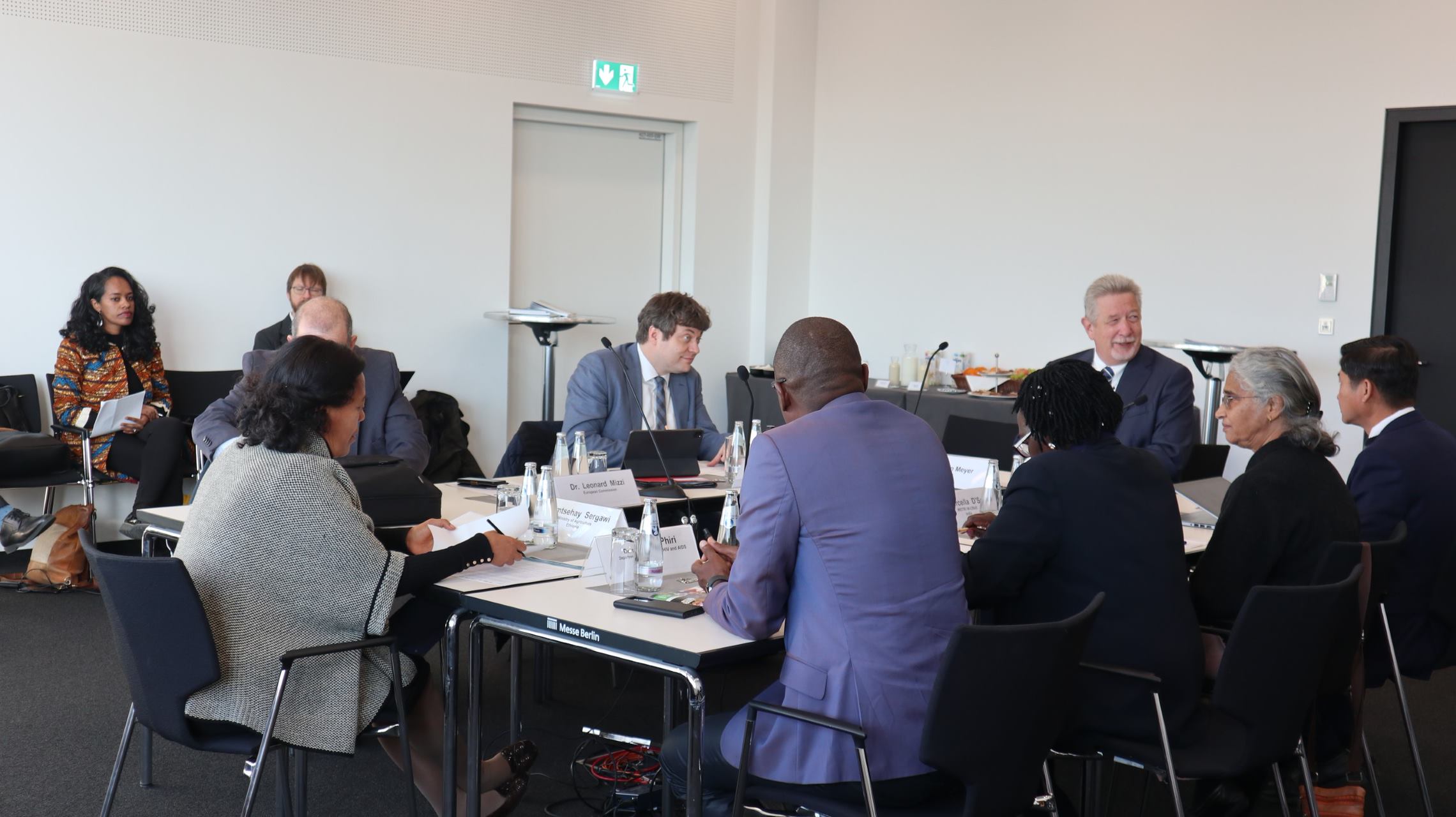Emergency solution or silver bullet?
Highlights of discussions on how to steer national pathways for food system transformation at GFFA 2023
by Daniel Montas | 2023-01-31

The concept of food systems transformation is increasingly ubiquitous in international discourse. Notwithstanding, there is limited analysis, or shared understanding, about the underlying political and governance structures that are critical in delivering such transformation. It is for this reason that TMG and partners brought together 13 food security experts and stakeholders drawn from youth, civil society, academia, government, and the private sector to Berlin to explore what governance structures are needed to transform national food systems. With participants from Cambodia, Ethiopia, India, Kenya and Malawi and Germany, the discussions further explored how international cooperation can better support such governance processes. The following is a brief recap of the discussions.
Creating a common understanding
The first day of the event series focused on establishing a common understanding of key issues to guide further discussions. This included agreeing on a set of definitions around food systems and food systems governance and what the enactment of such governance entailed. One message clearly resonated throughout the conversation: Food systems transformation needs more effective governance. This was recognized due to the fact that even though the necessity to urgently transform food systems is evident, ambitious and integrated approaches for the governance of sustainable food systems are broadly absent.
The group therefore identified ten components necessary to create an enabling environment for effective governance of food systems transformation. These are: Empowerment, Awareness Raising and Continuous Dialogue, Adaptability and Resilience, Integrated Multisectoral Approaches, Transparency and Accountability, Leadership, Political Prioritization, Coordination Among Actors, Inclusion, and Transformative Capacity.
Based on these components, the group highlighted that Governance does not mean government, it means a multi-stakeholder approach. Moreover, because it is a process dependent on a variety of actors which differ substantially in (political) assertiveness, generally, those who are doing the job must be able to do the job. This means that special attention should be given to the empowerment of marginalized groups including especially women and youth, as well as thorough understanding of local needs as primary foundation towards the strategic conception of development initiatives. In effect, governance needs a different, more political approach.
Exploring Governance
After laying this conceptual foundation, discussions on the second day distilled some key insights for policy and action. In the first of two guiding presentations, the EU High-Level Expert Group assessing the need for an International Platform for Food Systems Science (IPFSS), explored how to strengthen multi-stakeholder science-policy-society interfaces to transform food systems. The discussion further underscored the importance of having a clear policy direction when engaging with diverse development partners at both national and international level.
The second presentation sought to assess the support of the EU for sustainable agri-food systems (SAFS), building on an evaluation conducted by the European Centre for Development Policy Management (ECDPM). The study's conclusions reiterated the call for a more strategic and systemic approach within the EU when interacting with partner countries. In this regard, the EU should anchor its support to SAFS in broader, long-term EU-country partnership agendas that prioritizes the needs of the most vulnerable food systems actors. Furthermore, a common understanding of context-specific challenges and opportunities at country and regional level must be developed.
In ensuing discussions, participants reiterated the importance of adopting a food system lens in international development cooperation, while ensuring that farmers and their organizations, civil society actors and the private sector are treated not as "beneficiaries" but equal partners. Furthermore, appropriate investment in applied research and advisory services focusing on sustainable practices taking into consideration local and indigenous knowledge should be prioritized.

Presenting Recommendations
The expert discussions culminated in a three-page summary document that was presented to delegates from the German Federal Ministry for Economic Cooperation and Development (BMZ) and the EU Commission. Both delegations recognized the importance of including multiple stakeholders in the governance of food system transformation (FST) and prioritizing such integrated approaches in both the global North and South. While acknowledging the challenges posed by current fragmented approaches to international cooperation, the two development partners highlighted ongoing efforts to improve policy coherence. They also identified additional elements of a FST approach – such as financing and trade - that should be further explored.
GFFA Panel
Wrapping it up: the event series ended with an expert panel at the Global Forum for Food and Agriculture (GFFA). Here, we approached the question of how to tackle the multiple problems facing our food systems. Representatives from Cambodia, Ethiopia and Kenya were invited to provide a brief overview on the state of their National Food System Transformation Pathways. Likewise, highlighting the role of Science-Policy interfaces for food systems transformation, a representative of the EU High-Level Expert Group offered insights on analytical challenges faced by researchers. In the subsequent rich discussions it the multiple examples it became clear that there is no silver bullet for dealing with the multifaceted challenges of FST. However, the importance of political will to systematically address the problem and look for context-specific solutions should be emphasized.
In conclusion, the key issues raised during this event series largely anticipated – or inspired – similar findings highlighted in the final GFFA Communiqué endorsed by 64 agriculture ministers.
A strong and inclusive multi-stakeholder approach with an explicit role for local stakeholders is crucial for transforming food systems. We emphasise the need to establish and strengthen mechanisms to involve stakeholder groups in policy formulation to develop readily available, accessible and affordable solutions for everyone. This applies especially to family farmers, smallholders, women, youth and people in vulnerable and marginalised groups.
The series of events was hosted by TMG Research gGmbH, the Andreas Hermes Academy, Deutsche Gesellschaft für internationale Zusammenarbeit (GIZ) the European Commission, Welthungerhilfe and World Wide Fund For Nature (WWF). Results of the first two-days of discussion were forwarded to the German Federal Ministry for Economic Cooperation and Development (BMZ) and the Directorate General of the EU Commission, feeding into a GFFA high-level expert panel on the topic: Emergency solution or silver bullet? National pathways for food system transformation.
 Land Governance Jul 16, 2024
Land Governance Jul 16, 2024Investing in community level land and environment governance institutions is imperative to the success of national forest and landscape restoration plans: TMG case study of Bua catchment in Malawi
A case study of forest protection and conservation measures implemented Bua catchment area in Malawi, and the tenure rights dynamics for local communities living adjacent to forestlands.
Washe Kazungu
 Land Governance Jul 16, 2024
Land Governance Jul 16, 2024In Memory of Klaus Töpfer
Jes Weigelt reflects on the passing of Klaus Töpfer, the questions motivating his commitments, and the roots of TMG Research’s founding.
Jes Weigelt
 Food Systems Jul 08, 2024
Food Systems Jul 08, 2024Exploring pathways for governing food systems transformation (FST) in Kenya
TMG Research organized a workshop in Nairobi with diverse actors from government, civil society, private sector, and research to jointly explore governance mechanisms for the transformation of Kenya’s food systems.
Emmanuel Atamba
